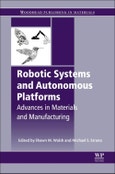Robotic Systems and Autonomous Platforms: Advances in Materials and Manufacturing showcases new materials and manufacturing methodologies for the enhancement of robotic and autonomous systems. Initial chapters explore how autonomous systems can enable new uses for materials, including innovations on different length scales, from nano, to macro and large systems. The means by which autonomous systems can enable new uses for manufacturing are also addressed, highlighting innovations in 3D additive manufacturing, printing of materials, novel synthesis of multifunctional materials, and robotic cooperation. Concluding themes deliver highly novel applications from the international academic, industrial and government sectors.
This book will provide readers with a complete review of the cutting-edge advances in materials and manufacturing methodologies that could enhance the capabilities of robotic and autonomous systems.
Please Note: This is an On Demand product, delivery may take up to 11 working days after payment has been received.
Table of Contents
Section A Actuation 1. Manipulation, assembling, and actuation of nanomotors by electric tweezers Donglei (Emma) Fan 2. Artificial muscle logic devices for autonomous local control E.-F. Markus Henke, Katherine E. Wilson, Geoffrey A. Slipher, Randy A. Mrozek, Iain A. Anderson 3. Hygromorphic living materials for shape changing Lining Yao
Section B Mobility 4. Fluid-driven intrinsically soft robots Robert Shepherd, Kirstin Petersen 5. Designing Proteus: Engineering form and function for microrobotics Remmi Baker, Allan M. Brooks, Ayusman Sen 6. Physics approaches to natural locomotion: Every robot is an experiment Yasemin Ozkan Aydin, Jennifer M. Rieser, Christian M. Hubicki, William Savoie, Daniel I. Goldman 7. Robotic colloids: Engineered self-propulsion at the microscale (and smaller) Jeffrey L. Moran
Section C Control Theory and Algorithms Logic and Proxy Electronic Functions Algorithmic Materials 8. Soft timer: Dynamic clock embedded in soft body Kohei Nakajima, Tao Li, Nozomi Akashi 9. Algorithmic materials: Embedding computation within material properties for autonomy Ana Pervan, Todd Murphey 10. Achieving self-sustained motion of particles in solution with chemical pumps Oleg E. Shklyaev, Henry Shum, Anna C. Balazs 11. Topology optimization for robotics applications Raymond Wildman, Andrew Gaynor
Section D Integration 12. Robotic materials for robot autonomy Nikolaus Correl 13. 3D printed electronic materials and devices Ruitao Su, Sung Hyun Park, Zhaohan Li, Michael C. McAlpine 14. Additive manufacturing of soft robots S. Walker, O.D. Yirmibesoglu, U. Daalkhaijav, Y. Menguc 15. Synthetic cells, or colloidal state machines, with two-dimensional materials Jingfan Yang, Volodymyr B. Koman, Pingwei Liu, Tianxian Liu, Michael S. Strano
Section E Energy 16. Energy harvesting techniques mediated by molecular interactions with nanostructured carbon materials Albert Tianxiang Liu, Ge Zhang, Michael S. Strano 17. Mechanics of fluid-elastomer systems in soft robotics Carmel Majidi 18. Structural power, energy, actuation, and mobility in intelligently directed systems enabled from nanocrystalline metals Anit K. Giri, Kristopher A. Darling, Shawn M. Walsh
Section F Novel Robotics as Material Platforms 19. Materials design for robotic platforms enabling unique mechanisms of projectile protection Pingwei Liu, Michael S. Strano 20. The confluence of intelligent agents and materials to enable protection of humans in extreme and dangerous environments Shawn M. Walsh, Daniel M. Baechle 21 Super materials and robots making robots: Challenges and opportunities in robotic building at the microstructural level Ron Pelrine








